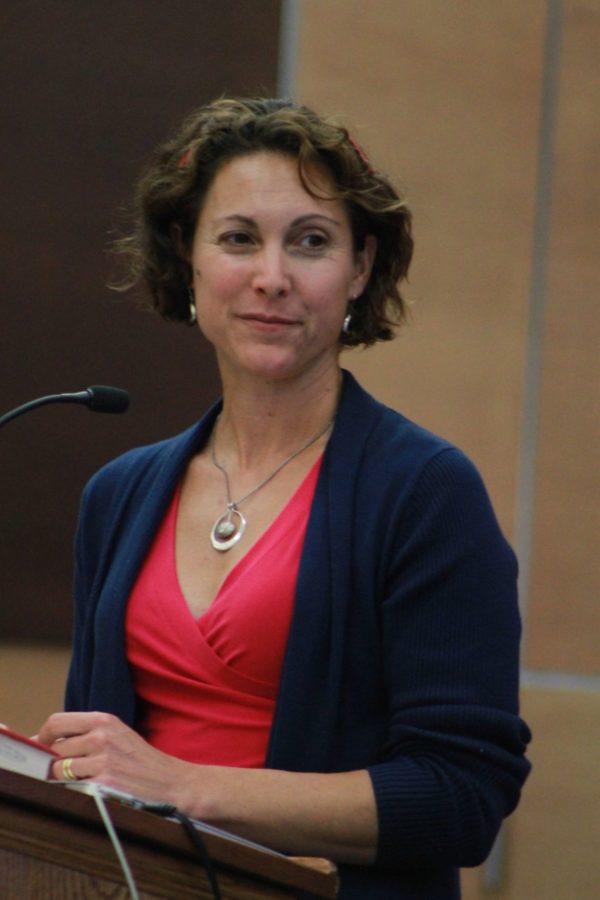Question & Answer with Emily Bazelon, McBride Lecturer
October 6, 2014
While bullying is seen as an issue of adolescence, New York Times Magazine staff writer Emily Bazelon captivated the Simpson College community about the culture of bullying during her address at the 2014 McBride Lecture.
Bazelon is a former editor for Slate magazine and has also had appearances on NPR’s Fresh Air and All Things Considered, along with Comedy Central’s Colbert Report.
Bazelon started covering the issues of bullying five years ago, and authored the book Sticks and Stones: Defeating the Culture of Bullying and Rediscovering the Power of Character and Empathy in the past year.
According to Bazelon, her interest in bullying was not sparked because of experiences with bullying, but because of the attention the issue was receiving in the media.
“It struck me that this is the kind of attention that can really help us as a society to make sure kids are treating each other well, and really help improve the lives of kids,” Bazelon said.
In her lecture Bazelon covered changing trends in bullying, bullying with the emergence of social media and ways to positively counteract the problem.
Along with Simpson students, faculty and staff, students from the Indianola Middle School made a trip the campus to hear Bazelon’s speech on an issue that hits close to home.
After the lecture, Bazelon sat down with the Simpsonian for a brief interview:
The Simpsonian: Bullying seems to be an issue that you see more in elementary, middle and high school. Why should college students pay attention and worry about the issue?
Bazelon: You’re right that rates of bullying are higher in middle school and start tapering off in high school, but I think college students should pay attention for a couple of reasons. Some of them will be going into the education profession and working with younger kids. Many of them will be parents so they’ll be thinking about younger kids and the third reason is that some college students have very powerful memories of this from high school and middle school that they’re still working through. They also need to make sure this kind of cruelty is not happening on campuses. The fact that it’s happening more among younger kids doesn’t mean it doesn’t happen in college.
The Simpsonian: You mentioned that bullying can still happen in college. Since Simpson is a smaller campus, could bullying be a bigger issue since it’s such a close community compared to a larger public school?
Bazelon: I think it can be different, but it could happen at either place. What I think is more common for people your (college) age is social ostracism, or making people feel that they aren’t welcome, or a group being really exclusive. Hazing with sororities and fraternities can also include bullying as well.
The Simpsonian: You mentioned that bullying usually involves some sort of power imbalance. Can bullying go beyond school into the work place where there is a power imbalance among employees?
Bazelon: People do experience it in the work place, but it can also be coworkers. That’s something that’s really tricky for places to address. Sometimes, even if you don’t have power over someone, but you’re a coworker that is really well connected or, just really good at sabotaging someone else’s work or a bunch of coworkers ganging up on someone, that can feel like bullying. Just as we tell kids you need to find someone to help you, you have to do that in the work place too and sometimes that’s not easy to figure out.
The Simpsonian: In your professional work with bullying, would you consider yourself more a reporter or an advocate?
Bazelon: I’m definitely more a reporter. I don’t run an anti-bullying program. I think no one is in favor of bullying, so in that sense I have a stance in it, but I’m not an activist pushing for a kind of approach. I’m more trying to survey the field and the research that’s been done so I can say, “Oh, that looks that looks promising because they’ve shown these results” and I tell everyone about that. I’m kind of a conduit for information rather than pushing some sort of line.
The Simpsonian: My final question, because we have a large viewing audience here, what’s it like being on the Colbert Report?
Bazelon: The Colbert Report is a lot of fun to be on. They’re a super nice group of people. You’ll have a dog running around backstage that belongs to someone on my staff. They also let my kids come with me and they enjoy being apart of that. The Colbert Report is going to end at the end of the year and Stephen is moving onto a new show, but the staff is going with him so hopefully they’ll keep that same kind of spirit. I find that people know me from those TV appearances more than anything else. I’ve written thousands of words, but those few minutes of television seem to be what people bring up.













